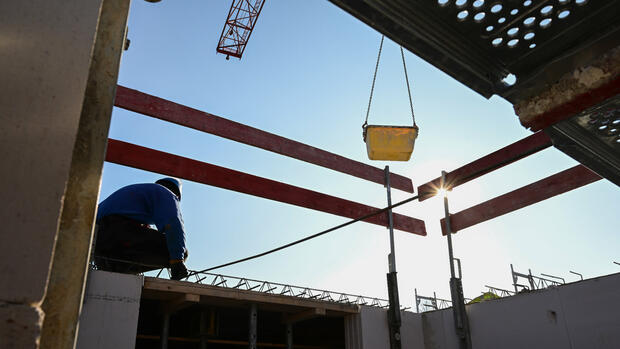So far, only five percent of apartments in Germany are built according to the Lego principle.
(Photo: dpa)
Berlin There is a lack of affordable housing in Germany. In order to make faster progress in housing construction, Federal Building Minister Klara Geywitz is relying on serial and modular construction with prefabricated parts. Once planned and designed, buildings can be built in different places, says the SPD politician. This is faster than if each building had to be planned and built individually.
In the future, the Federal Foundation for the Building Academy will ensure that building based on the Lego principle progresses. This emerges from a letter from the Federal Ministry of Building, which is available to the Handelsblatt. Accordingly, the building academy as an office should organize “a long-term think tank” on the subject. The Bauakademie is funded by the Federal Ministry of Building and deals with all questions relating to the planning, construction and operation of buildings and settlement projects in the 21st century.
It is intended to intensify the transfer of knowledge on serial construction “in order to make experience available to all those involved and to bring additional solutions suitable for medium-sized companies into practical housing construction,” says the letter from the Federal Ministry of Construction.
It should not just be about building complete buildings in series or using prefabricated modules. It’s also about using more common and/or pre-built parts to build faster.
Especially when building multi-storey houses, this procedure is the key, to quickly meet the growing need for affordable housing. According to the Central Real Estate Committee (ZIA), Germany has so far only had a share of around five percent of modular apartments.
Prejudices against modular construction persist
Causes are prejudices such as a supposedly inferior building quality or the tendency to individual construction on the part of the administration. Jan-Hendrik Goldbeck, building contractor and Vice President of the ZIA, considers the argument of a “panel 2.0” to be advanced: The architectural possibilities in system construction are “extremely diverse” today, he told the Handelsblatt.
Goldbeck calls for a fixed quota for Lego construction in metropolitan areas. “At least 30 percent of a city’s required expansion should be immediately designated for serial and modular construction,” said Goldbeck.
Serial construction was used in the new construction of the Bundestag building.
(Photo: Imago)
The fact that the federal foundation is now given a new task is due to the Alliance for Affordable Housing. Geywitz initiated the alliance of representatives from politics, business and civil society last year in order to speed up construction projects. The alliance had decided to set up an office and a round table on “serial construction”.
>> Read here: Minister Geywitz sees no quick solution for more affordable housing
According to the ministerial letter, which is addressed to the members of the alliance, representatives of the federal states and municipalities, the housing and construction industry as well as the construction and economics ministries are sitting at the round table. It is led by the two state secretaries Rolf Bösinger and Sören Bartol of the Ministry of Construction, who also signed the letter. This round can turn working groups too important Decide on topics, which then submit regular reports.
Type approvals should enable serial construction nationwide
The letter goes on to say: “In the future, the digitization of processes, automated production and uniform assessments under building regulations, such as approvals for individual building types, should also be considered.
Since there is no uniform building law in Germany, it is necessary type approvals, to fully exploit the possibilities of serial construction. However, some federal states have not anchored such permits in their state building codes. An adjustment of the 16 state building regulations would be necessary here.
>> Read here: Slow-moving approval processes are slowing down housing construction
Specifically, the round table is to meet for the first time on September 5th and then meet every six months. It can be convened “in critical phases” and, if necessary, also at short notice.
The working groups will meet several times a year. The alliance members should nominate representatives for all bodies by the end of the month. However, the Ministry expressly asks that the members “have practical experience as far as possible” or at least have “practical relevance”.
This view from practice should be helpful. The entrepreneur Goldbeck regrets that although there is a clear and broad commitment to serial construction, in practice “hardly any permits are granted”. In his experience, prefabricated buildings can be erected up to 50 percent faster and 10 to 20 percent cheaper.
More: How quickly affordable housing could be created with the “Lego principle”.
